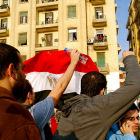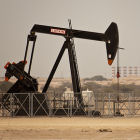
Members of royal families around the world often express support for science, but Princess Sumaya bint El Hassan of Jordan stands out for taking a particularly close and active interest.
She is a founder and president of the El Hassan Science City, president of Jordan’s Royal Scientific Society and chair of the board of trustees of the Princess Sumaya University for Technology. She has also recently helped set up a science and technology collaboration centre for the Middle East, in Jordan.
This month is the anniversary of two Arab uprisings, in Egypt and Tunisia. We asked Princess Sumaya about the impact the Arab Spring has had on science in the region, her views on science diplomacy, and her hopes and fears for science, education and innovation.
How has the Arab Spring provided opportunities for science and technology?
A large part of it is people starting to think in terms of meritocracy. A huge potential of talent has been unleashed — talent that was previously held back by corruption and by cronyism, and by a disregard for meritocratic progress.
This is when we can start talking about the Arab Spring becoming the Arab Summer — when we see people assessed on, and acknowledged for what they are able to contribute. You cannot have successful scientific cooperation without meritocracy.
The great new freedom has started to entice a lot of the Arab diaspora — we have lost so many of our talented people in the past.
Is there a lesson for other Arab countries that have not experienced protests?
I think so and that’s not just the result of the Arab Spring. Slowly people have started to realise that the way forward is investment in human resources, not in cement or other commodities. And, while some of our neighbouring countries have put huge amounts into science cities and so on, ultimately it’s the working partnerships that we develop between different scientists that will make the big difference. In Jordan, our great resource is human capital and that is what we are investing in.
When we think about the Arabic and Islamic world, the contribution we have made to science and technology is a very important part of our heritage, and now is the time for us to continue from where we left off.
So what are the main obstacles to science in the Arab world?
I think it’s re-establishing that feeling of ownership over innovation for community development. At the same time a lot of Arabs are feeling the weight of Western scientific hegemony. It’s not an excuse for anger or lethargy, but a call to action for a new generation with new ambition. In the Middle East we have focused a lot on imitation, and only in the last few years on innovation once again. Now we really need to start educating people on intellectual property rights and technology commercialisation.
 It has been a year since the start of Egypt’s revolutionFlickr/rouelshimi
It has been a year since the start of Egypt’s revolutionFlickr/rouelshimiWhat can be learnt from experiences in the West?
We can learn a lot of lessons from the West. One of the analogies I use is that when you look at a fragmented Europe after the Second World War you wouldn’t have expected some of the nations, such as France and Germany, to speak to each other again, but it was elements of science that brought Europe together and led to the second industrial revolution.
And I believe that, in the Arab world, if we started talking together — with the financial resources in some of our rich Gulf countries that are available as well as the human resources in countries such as mine, or Egypt, or Lebanon and Syria — that’s where we can really build a second scientific Golden Age.
What, if anything, is the role for science diplomacy?
Science always flourishes when talent is given freedom and support to apply itself, but I think mentorship programmes are the best approach for success and sustainability. If you can collaborate as people, the money will eventually come in. We have to make sure that science is directed at solving the challenges that we face in the region and that’s why we need to talk to each other and cooperate again.
At the El Hassan Science City, we are now working closely with Arab-American professors from the University of California, Los Angeles, who are working as mentors for our researchers in Jordan. The Science City in itself is a way of attracting back the lost Arab diaspora, and with the wonders of modern communications we are also able to develop our capacity without people actually being here.
The agreement that the Science City has with the SESAME project [Synchrotron-light for Experimental Science and Applications in the Middle East — funded by several Middle East countries, and based in Jordan] brings a huge advantage for collaboration with different nations. Some might not sit together around the political table, but scientifically we can overcome that political hurdle.
How do we make sure everyone benefits from science diplomacy?
In Jordan we recently signed an agreement for the development of the first UN ESCWA [Economic and Social Commission for Western Asia] technology centre for research and scientific collaboration. It’s the first time ESCWA has opened an office outside its headquarters and this centre involves 14 Arab countries. The idea is to increase not only Arabic content on the Internet but also to provide an opportunity for research and alliances.
The more we as a region can start addressing combined strategies and identifying national priorities — but where everyone gets a slice of the pie — the better.
Science culture must become an intrinsic part of our development from school age up.
 Oil-rich countries could help the whole Arab region developFlickr/potomo
Oil-rich countries could help the whole Arab region developFlickr/potomoWhat is the future for education and innovation in the region?
We are very focused on teaching and learning by rote and not being able to question. I think the fact that we have a generation that now wants to stand up and ask questions, and is being given the freedom to do so, is probably the first symbolic step forwards.
And then, of course, a more equitable division of resources is the right way to go about things. That starts with education and is particularly important with tertiary education. We must ensure that we build a quality university system that is affordable to the less well off. We have missed so much potential because education has not been equitable in our region.
I don’t have a PhD. Life experience can teach you a lot and while I don’t undermine the importance of a PhD, it’s also very important to acknowledge the role of entrepreneurial thinking. Enabling the right environments is very important.
When you look at innovation ecosystems you realise that it is young people who need to have an environment in which to become creative and commercialise technologies.
So a combination [of the traditional and the entrepreneurial] is the formula for success that we need.
And what is the position of women in science?
There’s a lot of encouragement given to women in science in my country. More than half of our undergraduate science students are women.
At my university we have just appointed the first woman dean for engineering, the first one in Jordan. Because women still traditionally have a dual role — they are also a mother and a wife — if you educate a woman, you educate a family.
It is very important that this is supported. There are a lot of women in the Arab world in leadership positions who are now able to give support to other women.
It is very rare now that you don’t see girls being educated in the Arab world — it’s one of the success stories of the MDGs [Millennium Development Goals]. With the advancement of social media you can’t keep women in the dark anymore.
Link to opinion by Princess Sumaya bint El Hassan
You must be logged in to post a comment.